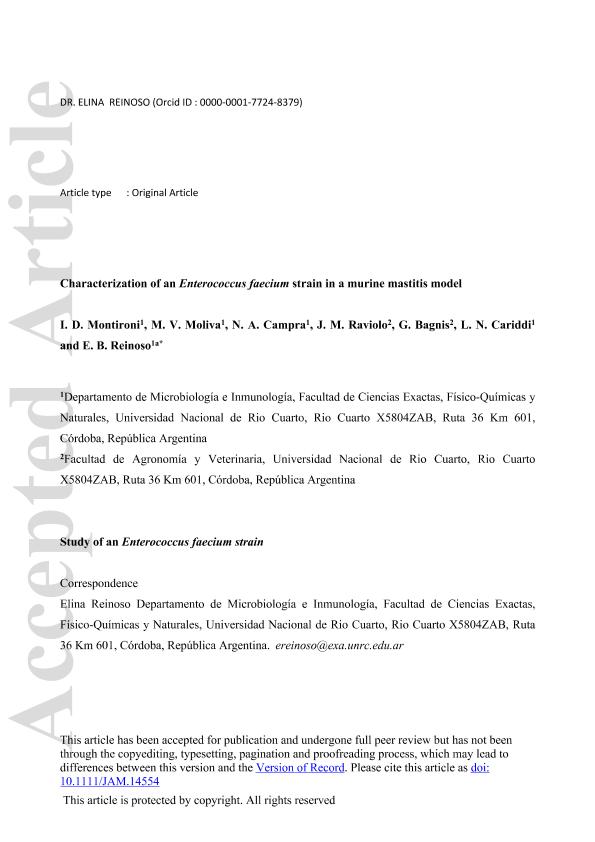Artículo
Characterization of an Enterococcus faecium strain in a murine mastitis model
Montironi, Ivana Dalila ; Moliva, Melina Vanesa
; Moliva, Melina Vanesa ; Campra, Noelia Anahí
; Campra, Noelia Anahí ; Raviolo, Jose Maria
; Raviolo, Jose Maria ; Bagnis, Guillermo; Cariddi, Laura Noelia
; Bagnis, Guillermo; Cariddi, Laura Noelia ; Reinoso, Elina Beatríz
; Reinoso, Elina Beatríz
 ; Moliva, Melina Vanesa
; Moliva, Melina Vanesa ; Campra, Noelia Anahí
; Campra, Noelia Anahí ; Raviolo, Jose Maria
; Raviolo, Jose Maria ; Bagnis, Guillermo; Cariddi, Laura Noelia
; Bagnis, Guillermo; Cariddi, Laura Noelia ; Reinoso, Elina Beatríz
; Reinoso, Elina Beatríz
Fecha de publicación:
05/2020
Editorial:
Wiley Blackwell Publishing, Inc
Revista:
Journal of Applied Microbiology
ISSN:
1364-5072
e-ISSN:
1365-2672
Idioma:
Inglés
Tipo de recurso:
Artículo publicado
Clasificación temática:
Resumen
The aim of the study was to characterize phenotypically and genotypically Enterococcus faecium strains collected from bovine mastitis milk and to evaluate one of them for its virulence in a murine mastitis model. Methods and Results: A total of five E. faecium isolates were collected from cows with subclinical mastitis. EF-7A showed resistance to antibiotics tested, it presented alpha haemolysin and did not present gelatinase activity. It yielded cyA, efafm and gelE1 genes and it could be characterized as a moderate biofilm producer. It was able to internalize in MAC-T cells and 1×108 colony forming unit ml-1 was able to establish an intramammary infection in mice. The strain could be recovered from liver, kidney and blood samples. RAPD profiles showed different bands with respect to the inoculated strain. Histopathology analyses showed different grades of polymorphonuclear neutrophils infiltration in mammary glands. Conclusion: This is the first report that studied E. faecium strain in a lactating mouse model of mastitis and showed that the experimental inoculation was able to stimulate an inflammatory response resulting in mastitis. Results contribute to a better understanding of intramammary infections caused by E. faecium. Significance and Impact of the Study: This investigation shows that mice represent a valuable model for the study of the mastitis pathogenesis caused by E. faecium considering the high costs of using cows for mastitis research.
Palabras clave:
ENTEROCOCCUS FAECIUM
,
MASTITIS
,
MURINE MODEL
,
VIRULENCE
Archivos asociados
Licencia
Identificadores
Colecciones
Articulos (INBIAS)
Articulos de INSTITUTO DE BIOTECNOLOGIA AMBIENTAL Y SALUD
Articulos de INSTITUTO DE BIOTECNOLOGIA AMBIENTAL Y SALUD
Citación
Montironi, Ivana Dalila; Moliva, Melina Vanesa; Campra, Noelia Anahí; Raviolo, Jose Maria; Bagnis, Guillermo; et al.; Characterization of an Enterococcus faecium strain in a murine mastitis model; Wiley Blackwell Publishing, Inc; Journal of Applied Microbiology; 128; 5; 5-2020; 1289-1300
Compartir
Altmétricas



